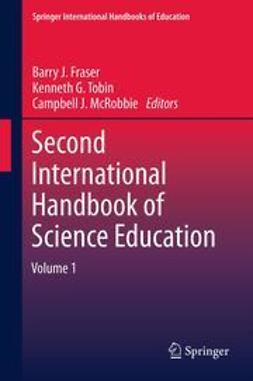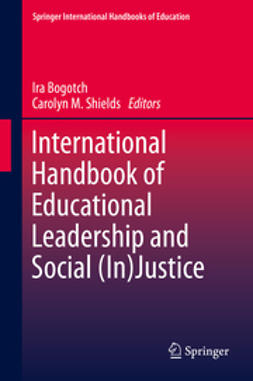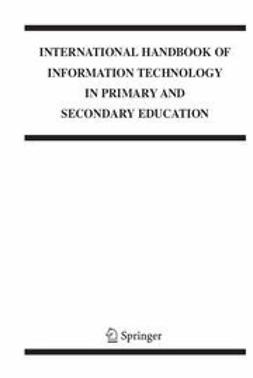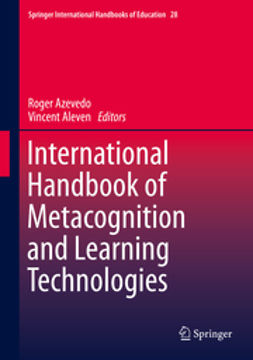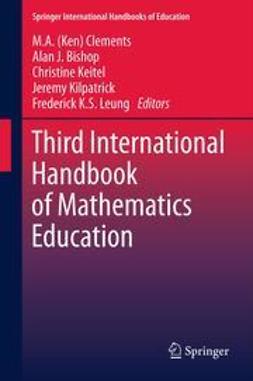Fraser, Barry J.
Second International Handbook of Science Education
1. Sociocultural Perspectives on Science Education
Kenneth Tobin
2. Understanding Engagement in Science Education: The Psychological and the Social
Stacy Olitsky, Catherine Milne
3. Identity-Based Research in Science Education
Yew-Jin Lee
4. Diverse Urban Youth’s Learning of Science Outside School in University Outreach and Community Science Programs
Jrène Rahm
5. Reality Pedagogy and Urban Science Education: Towards a Comprehensive Understanding of the Urban Science Classroom
Christopher Emdin
6. Learning Science Through Real-World Contexts
Donna King, Stephen M. Ritchie
7. Collaborative Research Models for Transforming Teaching and Learning Experiences
Rowhea Elmesky
8. Science Learning in Urban Elementary School Classrooms: Liberatory Education and Issues of Access, Participation and Achievement
Maria Varelas, Justine M. Kane, Eli Tucker-Raymond, Christine C. Pappas
9. How Can Conceptual Change Contribute to Theory and Practice in Science Education?
Reinders Duit, David F. Treagust
10. Reframing the Classical Approach to Conceptual Change: Preconceptions, Misconceptions and Synthetic Models
Stella Vosniadou
11. Metacognition in Science Education: Past, Present and Future Considerations
Gregory P. Thomas
12. Learning From and Through Representations in Science
Bruce Waldrip, Vaughan Prain
13. The Role of Thought Experiments in Science and Science Learning
A. Lynn Stephens, John J. Clement
14. Vygotsky and Primary Science
Colette Murphy
15. Learning In and From Science Laboratories
Avi Hofstein, Per M. Kind
16. From Teaching to KNOW to Learning to THINK in Science Education
Uri Zoller, Tami Levy Nahum
17. The Heterogeneity of Discourse in Science Classrooms: The Conceptual Profile Approach
Eduardo F. Mortimer, Phil Scott, Charbel N. El-Hani
18. Quality of Instruction in Science Education
Knut Neumann, Alexander Kauertz, Hans E. Fischer
19. Personal Epistemology and Science Learning: A Review on Empirical Studies
Fang-Ying Yang, Chin-Chung Tsai
20. Science Learning and Epistemology
Gregory J. Kelly, Scott McDonald, Per-Olof Wickman
21. Science Teacher Learning
John Wallace, John Loughran
22. Teacher Learning and Professional Development in Science Education
Shirley Simon, Sandra Campbell
23. Developing Teachers’ Place-Based and Culture-Based Pedagogical Content Knowledge and Agency
Pauline W. U. Chinn
24. Nature of Scientific Knowledge and Scientific Inquiry: Building Instructional Capacity Through Professional Development
Norman G. Lederman, Judith S. Lederman
25. Mentoring in Support of Reform-Based Science Teaching
Thomas R. Koballa, Leslie U. Bradbury
26. Multi-paradigmatic Transformative Research as/for Teacher Education: An Integral Perspective
Peter Charles Taylor, Elisabeth (Lily) Taylor, Bal Chandra Luitel
27. Teaching While Still Learning to Teach: Beginning Science Teachers’ Views, Experiences, and Classroom Practices
Julie A. Bianchini
28. Developing Science Teacher Educators’ Pedagogy of Teacher Education
Amanda Berry, John Loughran
29. Using Video in Science Teacher Education: An Analysis of the Utilization of Video-Based Media by Teacher Educators and Researchers
Sonya N. Martin, Christina Siry
30. Professional Knowledge of Science Teachers
Hans E. Fischer, Andreas Borowski, Oliver Tepner
31. Science Teaching Efficacy Beliefs
Jale Cakiroglu, Yesim Capa-Aydin, Anita Woolfolk Hoy
32. Context for Developing Leadership in Science and Mathematics Education in the USA
James J. Gallagher, Robert E. Floden, Yovita Gwekwerere
33. Research on Science Teacher Beliefs
Lynn A. Bryan
34. Still Part of the Conversation: Gender Issues in Science Education
Kathryn Scantlebury
35. Respect and Science Learning
Adriane Slaton, Angela Calabrese Barton
36. Science Education in Rural Settings: Exploring the ‘State of Play’ Internationally
Debra Panizzon
37. Out of Place: Indigenous Knowledge in the Science Curriculum
Elizabeth McKinley, Georgina Stewart
38. On Knowing and US Mexican Youth: Bordering Science Education Research, Practice, and Policy
Katherine Richardson Bruna
39. Science Education Research Involving Blacks in the USA During 1997–2007: Synthesis, Critique, and Recommendations
Eileen Carlton Parsons, James Cooper, Jamila Smith Simpson
40. Social Justice Research in Science Education: Methodologies, Positioning, and Implications for Future Research
Maria S. Rivera Maulucci
41. Student Attitudes and Aspirations Towards Science
Russell Tytler, Jonathan Osborne
42. Children’s Attitudes to Primary Science
Karen Kerr, Colette Murphy
43. Developing Measurement Instruments for Science Education Research
Xiufeng Liu
44. Science Teaching and Learning: An International Comparative Perspective
Manfred Prenzel, Tina Seidel, Mareike Kobarg
45. Focusing on the Classroom: Assessment for Learning
Bronwen Cowie
46. Transfer Skills and Their Case-Based Assessment
Irit Sasson, Yehudit J. Dori
47. Competence in Science Education
Alexander Kauertz, Knut Neumann, Hendrik Haertig
48. Trends in US Government-Funded Multisite K—12 Science Program Evaluation
Frances Lawrenz, Christopher David Desjardins
49. Curriculum Integration: Challenging the Assumption of School Science as Powerful Knowledge
Grady Venville, Léonie J. Rennie, John Wallace
50. Risk, Uncertainty and Complexity in Science Education
Clare Christensen, Peter J. Fensham
51. An International Perspective on Science Curriculum Development and Implementation
Richard K. Coll, Neil Taylor
52. Curriculum Coherence and Learning Progressions
David Fortus, Joseph Krajcik
53. Socio-scientific Issues in Science Education: Contexts for the Promotion of Key Learning Outcomes
Troy D. Sadler, Vaille Dawson
54. Technology in Science Education: Context, Contestation, and Connection
Alister Jones
55. Web 2.0 Technologies, New Media Literacies, and Science Education: Exploring the Potential to Transform
April Luehmann, Jeremiah Frink
56. Leading the Transformation of Learning and Praxis in Science Classrooms
Stephen M. Ritchie
57. Understanding Scientific Uncertainty as a Teaching and Learning Goal
Susan A. Kirch
58. Citizen Science, Ecojustice, and Science Education: Rethinking an Education from Nowhere
Michael P. Mueller, Deborah J. Tippins
59. Change – A Desired Permanent State in Science Education
Hanna J. Arzi
60. Globalisation and Science Education: Global Information Culture, Post-colonialism and Sustainability
Lyn Carter
61. Metaphor and Theory for Scale-up Research: Eagles in the Anacostia and Activity Systems
Sharon J. Lynch
62. The Role of Argument: Learning How to Learn in School Science
Jonathan Osborne
63. Beyond Argument in Science: Science Education as Connected and Separate Knowing
Catherine Milne
64. Utilising Argumentation to Teach Nature of Science
Christine V. McDonald, Campbell J. McRobbie
65. Teacher Explanations
David Geelan
66. Argumentation, Evidence Evaluation and Critical Thinking
María Pilar Jiménez-Aleixandre, Blanca Puig
67. Constructivism and Realism: Dueling Paradigms
John R. Staver
68. Capturing the Dynamics of Science in Science Education
Michiel Eijck
69. Nature of Science in Science Education: Toward a Coherent Framework for Synergistic Research and Development
Fouad Abd-El-Khalick
70. Lifelong Science Learning for Adults: The Role of Free-Choice Experiences
John H. Falk, Lynn D. Dierking
71. Science, the Environment and Education Beyond the Classroom
Justin Dillon
72. Informal Science Education in Formal Science Teacher Preparation
J. Randy McGinnis, Emily Hestness, Kelly Riedinger, Phyllis Katz, Gili Marbach-Ad, Amy Dai
73. Out-of-School: Learning Experiences, Teaching and Students’ Learning
Tali Tal
74. Learning Beyond the Classroom: Implications for School Science
Peter Aubusson, Janette Griffin, Matthew Kearney
75. Science Stories on Television
Koshi Dhingra
76. Museum–University Partnerships for Preservice Science Education
Preeti Gupta, Jennifer D. Adams
77. Community Science: Capitalizing on Local Ways of Enacting Science in Science Education
Jennifer D. Adams
78. Learning Science in Informal Contexts – Epistemological Perspectives and Paradigms
David Anderson, Kirsten M. Ellenbogen
79. Classroom Learning Environments: Retrospect, Context and Prospect
Barry J. Fraser
80. Teacher–Students Relationships in the Classroom
Theo Wubbels, Mieke Brekelmans
81. Outcomes-Focused Learning Environments
Jill M. Aldridge
82. ICT Learning Environments and Science Education: Perception to Practice
David B. Zandvliet
83. Cultivating Constructivist Classrooms Through Evaluation of an Integrated Science Learning Environment
Rebekah K. Nix
84. Using a Learning Environment Perspective in Evaluating an Innovative Science Course for Prospective Elementary Teachers
Catherine Martin-Dunlop, Barry J. Fraser
85. Evolving Learning Designs and Emerging Technologies
Donna DeGennaro
86. The Impact of Student Clustering on the Results of Statistical Tests
Jeffrey P. Dorman
87. Interdisciplinary Perspectives Linking Science and Literacy in Grades K–5: Implications for Policy and Practice
Nancy R. Romance, Michael R. Vitale
88. Writing as a Learning Tool in Science: Lessons Learnt and Future Agendas
Brian Hand, Vaughan Prain
89. The Role of Language in Modeling the Natural World: Perspectives in Science Education
Mariona Espinet, Mercè Izquierdo, Josep Bonil, S. Lizette Ramos Robles
90. Teaching Science Reading Comprehension: A Realistic, Research-Based Approach
William G. Holliday, Stephen D. Cain
91. Building Common Language, Experiences, and Learning Spaces with Lower-Track Science Students
Randy K. Yerrick, Anna M. Liuzzo, Janina Brutt-Griffler
92. Understanding Beliefs, Identity, Conceptions, and Motivations from a Discursive Psychology Perspective
Pei-Ling Hsu, Wolff-Michael Roth
93. Qualitative Research Methods for Science Education
Frederick Erickson
94. Analyzing Verbal Data: Principles, Methods, and Problems
Jay L. Lemke
95. Employing the Bricolage as Critical Research in Science Education
Shirley R. Steinberg, Joe L. Kincheloe
96. Analyzing Verbal Data: An Object Lesson
Wolff-Michael Roth, Pei-Ling Hsu
Keywords: Education, Science Education, Educational Technology, Philosophy of Education
- Author(s)
- Fraser, Barry J.
- Tobin, Kenneth
- McRobbie, Campbell J.
- Publisher
- Springer
- Publication year
- 2012
- Language
- en
- Edition
- 1
- Series
- Springer International Handbooks of Education
- Page amount
- 17 pages
- Category
- Upbringing, Education
- Format
- Ebook
- eISBN (PDF)
- 9781402090417

